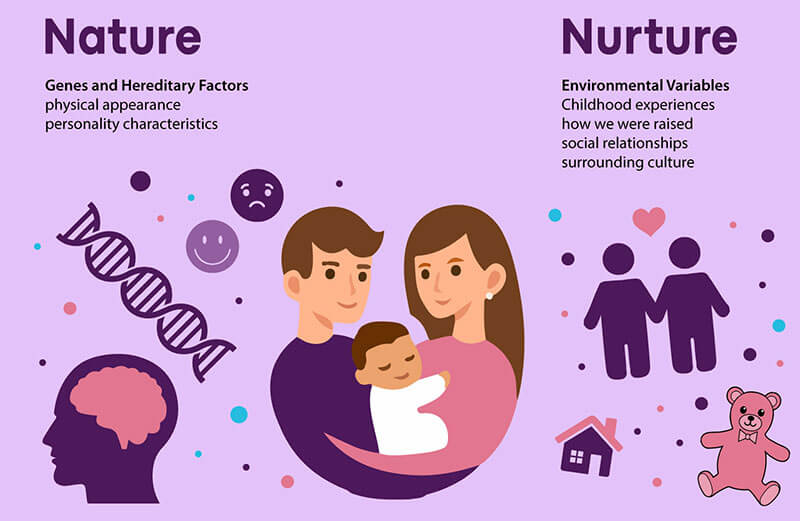Picture this: a man is on trial for a murder. His defenders say that he committed this crime because he grew up in a poor environment. This is an example of nurture. Yet others argue that his siblings grew up in the same environment and didn’t commit murder. This is an example of nature. Nature vs. nurture is a debate in the field of psychology that explores the contributions of genetics and environment on an individual’s development.
Views on Nurture
Junior Mia Gomez says she stands more on the side of nurture. She believes that the experiences people go through and the way they grow up shapes them and their mind. “Your morals and the things you decide to do regarding other people, such as how you pursue people in relationships or if you’re introverted or extroverted, are examples of how nurture may influence a person,” Mia says.
Junior Liana Bracero also leans more on the nurture side, saying we can all be born a certain way, but we still develop our personalities based on the way we grow up and the people we surround ourselves with.
Nature and Nurture Defined
According to the article titled “The Nature vs. Nurture Debate,” posted on the website for verywellmind.com, nature largely refers to our genetics, which includes the genes we’re born with and heredity factors that impact how our personality is formed and influenced. Genes provide the blueprints that influence physical traits. These include eye color, hair color, and height. Nature can also play a role in certain mental traits such as a person’s intelligence or personality. Hereditary can also control certain health or psychological conditions.
Meanwhile, nurture refers to the environmental factors that might impact who we become such as our upbringing, friendships, and our culture. Environmental influences can include family environment, socio-economic status, education, and life experiences.
Junior Jasmine Godoy believes that both nature and nurture have been significant in her life. “I believe nature has a huge impact on the way someone acts and thinks,” she said. “But I also believe in nurture. It is 100% true that someone’s environment can play a major role in how they act or think.”
Through her experiences, Jasmine has seen that nature plays a bigger role in behavior. “Family members of mine have pointed out behavioral similarities between my father and me, even though we don’t spend a lot of time together,” she said.
Nature vs. Nurture in Real Life
Both nature and nurture interact in important ways throughout our life. Intelligence is determined by genetics (nature); however, the environmental factors (nurture) such as access to education play a significant role as well.
According to an article “21 Nature vs Nurture Examples” published on the website for helpfulprofessor.com, in personality, both genetics and upbringing play a role. For instance, a child might inherit their parent’s introversion through genetics, but the way they socially interact with others may shape the way this trait is expressed.
With athletic abilities, some individuals may be more naturally fit and athletically talented than others, yet training, coaching, and access to sports facilities can enhance the development of these abilities.
Genetic factors can increase chances of predisposition to mental health conditions but environmental factors, including traumas or supportive family environments, can impact the development of mental health disorders.
My Opinion
I argue that nature and nurture are intertwined topics. You can’t have one without the other. This is because there are perfect examples of both nature and nurture in life such as, being born with specific physical features like both of your parents having blue eyes so you’re born with blue eyes. Regarding nurture, someone can be frugal with their money. Maybe they grew up poor so in adulthood they save their money up a lot and don’t like spending it.





















Juanita • Oct 17, 2023 at 7:46 am
Amazing article. Love it